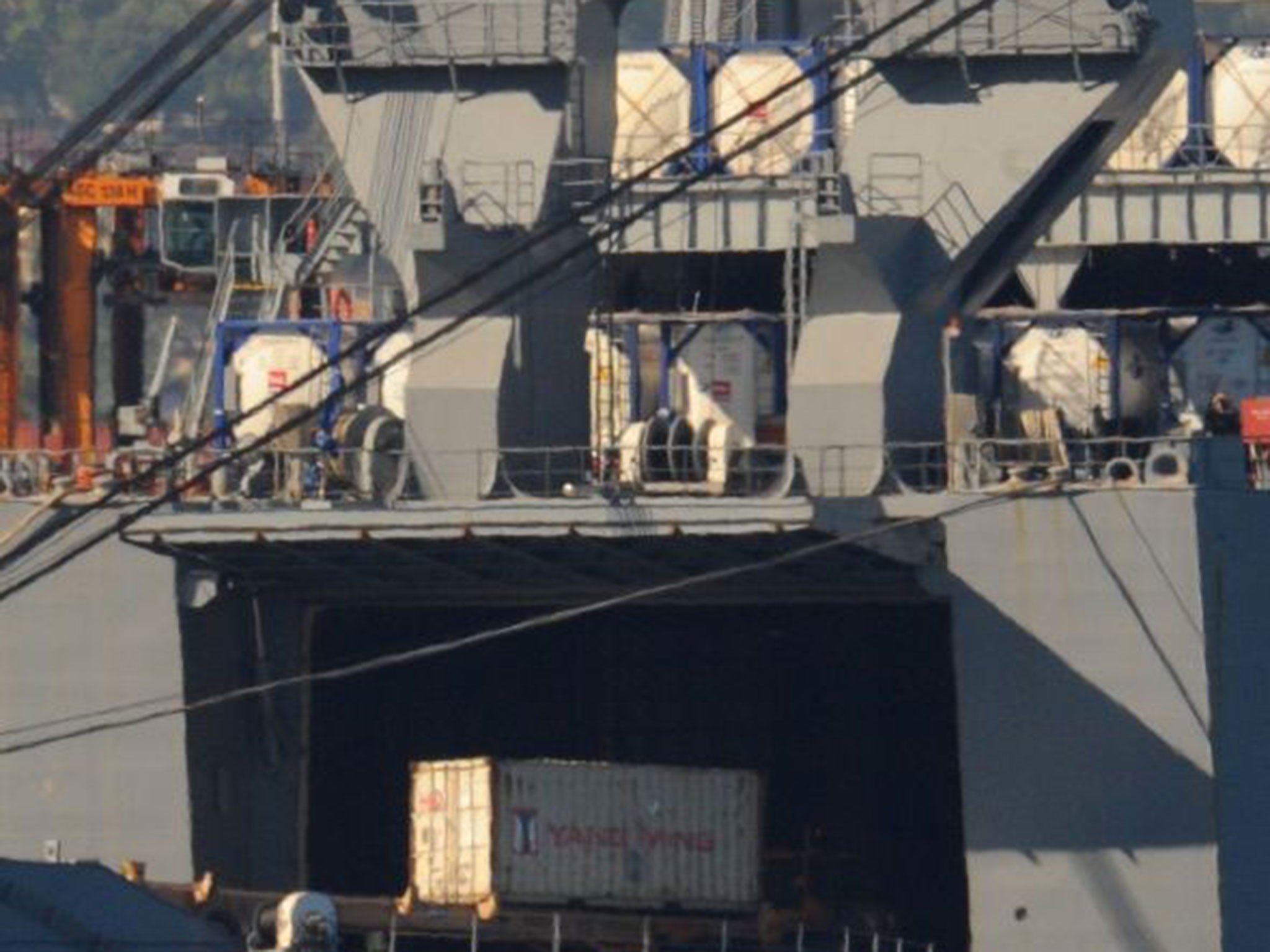Bad weather stymies activists' attempt to stop Syrian chemical weapons ship
Marine biologists warn that the process of neutralising chemical weapons could have 'catastrophic' ramifications for the ecosystem of the Mediterranean Sea

An attempt by a group of activists, scientists and politicians to sail from Greece to reach the waters where a US container ship is in the process of neutralising part of Syria's chemical weapons stockpile has been thwarted by bad weather.
The team of more than 30 wanted to use the trip, which began on Friday from Crete, to highlight their concerns about what they called a "dangerous precedent". But high waves forced them to turn back their flotilla yesterday, a turn of events that only heightened their concerns.
The MV Cape Ray, the vessel rendering the chemicals inert via a process involving the chemicals being heated and mixed with water, sodium hydroxide and sodium hypochlorite inside a titanium reactor, has already converted a significant proportion of the 600 tons on board since beginning its task earlier this month. The hazardous effluent is sent to other facilities to be destroyed.
The neutralisation procedure on board MV Cape Ray is disposing of nearly half of the Syrian arsenal of chemical weapons, the remaining 700 tons will be delivered to commercial and government facilities in Europe and the United States for destruction. The destruction of chemicals on board the vessel is endorsed by the United Nations and the Organisation for the Prohibition of Chemical Weapons
Marine biologists warn that the process could have 'catastrophic' ramifications for the very fragile ecosystem of the Mediterranean Sea, where sea water doesn't recycle itself as in oceans.
"Why do this at sea, and set such a dangerous precedent? We're talking about hazardous waste destruction here," said Thodoris Tsimpidis, the director of the Archipelagos Institute of Marine Conservation. "Class-A chemical weapons should not be treated at sea, which is a very unstable environment where anything can go wrong."
Those on the three-boat flotilla included Professor Evangelos Pissias, who said before the boat was turned back that he was prepared to face US military personnel tasked with protecting the M/V Cape Ray. ““We’re not violating any laws, we’re in our seas but they probably will want to discourage us and while we don’t want to provoke them into anything violent, it’s our duty to send them our message”.
Locals on nearby Crete have also expressed concerns. The mayor of Sfakia, Pavlos Polakis, said that he hoped the efforts of the group would throw light on the issue. "We want to tell [MV Cape Ray] to stop and get out. “
Navy Lieutenant-Commander Alana Garas, of US European Command, said that the US is "committed to ensuring that our Syrian chemical weapon neutralisation effort ensures the safety of people, protects the environment, follows OPCW verification procedures, and is consistent with applicable standards".
The crew of the flotilla said that they had faced large waves in the early hours of yesterday forcing the return of one boat, with the two others being forced to turn around by the evening. However, Lieutenant-Commander Garas said that MV Cape Ray possessed the tools to continue its mission even in bad weather and rough seas. She said that the vessel could move to avoid foul weather. If that is not possible, the ship has "gyrofin stabilisers to dampen the roll" of high seas and that extra time had been allotted to ensure the mission could be completed if operations need to be temporarily shut down because of heavy seas.
The MV Cape Ray continues with it task but it remains unclear whether the activists would sail again to intercept the vessel. Although Mr Polakis struck a defiant tone: “If you don't fight, you don't achieve anything; but if you do, you might achieve something."
Subscribe to Independent Premium to bookmark this article
Want to bookmark your favourite articles and stories to read or reference later? Start your Independent Premium subscription today.

Join our commenting forum
Join thought-provoking conversations, follow other Independent readers and see their replies